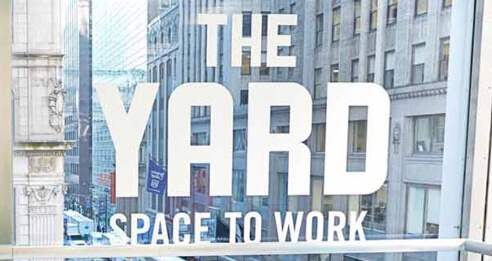
Largest Coworking Companies


Frank Cottle has been in the flexible workspace industry for over 30 years. As the founder and CEO of Alliance Virtual Offices and several other commercial real estate organizations, Cottle is an experienced investor and visionary in the industry with a particular passion for the technology that has brought this industry into the mainstream in recent years. At the Future Offices Winter conference in New York City, Cottle was a keynote speaker for several discussions about the where the industry is going in light of social and cultural changes in the workforce, trends in the coworking industry and what that means for traditional real estate and property management firms. We spoke with Cottle briefly after the event to get his personal take on the role of technology for coworking owners and operators who are competing with larger firms to attract members. In this interview he also shares his view of what it means to be a "smart space".

The flexible workspace sector is really a service industry. That service includes space and all of the support in the form of people and technology that every company needs. Historically landlords have not done that. They stay on the physical space side only and if you’ve know a lot of landlords, they’re not really good at service. So while they’ve stayed that way our industry has brought the service component to it. They are changing, not us. Properties companies are “amenitizing” right now, adding services. They started out with Equity Office property services back in the 90s. Property companies today are catching on that servicing the entire lifecycle of the customer is important. People want shorter cycle leases - some upside protection - primarily because of changes in accounting rules, leases that are over a year long are a liability on their balance sheet. Particularly in public companies. Based on our 40 years of experience I believe we’re a leader in this space, but this is a general condition change, not just something that we or even our industry is doing. The customer is demanding it and we are reacting.
Technology used to be in the 80s and 90s quite important as a profit center. We used to get $5 for a single fax page back in the 80s because people used to pay a huge premium just because we had a digital phone switch. Tech used to be quite a large profit center within the serviced office or flexible workspace sector. Today it’s just an amenity. Most people don’t want to be tied to a phone switch. Most new centers, particularly coworking centers don’t even put in phone systems. Everything is all about bandwidth. How much bandwidth do I have? How much can I get and how secure is it? That’s probably the biggest technology demand today at the customer level. At the operating level, access systems like Kisi, tracking systems that help people to know how long people are there and when, basically. Systems that provide data have become critically important. Because that data can then be used and shared to expand concepts like coworking.
In 1982 the first installation of ISP to up the bandwidth rate. We’ve been implementing tech for four decades. Today we use technology in booking and reservations and instant services for clients who manage a large portfolio of employees on a global basis. We’ve gone from providing phone and computer systems to people, to managing the movement of people. We think there is no such thing as an occupier of space anymore. There are only travelers. When we look at how to manage people, how to utilize space, we really look at how the hospitality and airline industries operate. We no longer all sit in a cube every day, people are constantly moving while they work.
I don’t think technology is the driver. People are the driver, changes in cultural and work structures, requirements by large companies to have flexible work plans, people’s desire to work closer to home and cut commute times, etc… These things are driving the industry. Technology is the enabler that allows this. That really comes down to bandwidth and communications devices. The things that we’re going to see are citywide mesh networks that allow the bandwidth to be more generally distributed. Bandwidth is going to become a right, like air and oxygen. It will just be provided everywhere, totally pervasive, you won’t necessarily know or care what network you are connected to as long as you have lot’s of power and lots of security. The security systems that allow you to protect your own data and files will become a critical part of the flexible work industry.
Security systems are going to become both the enabler and the bottleneck of the industry. We have to have it.
I’ll give you a perfect example. At the Future Offices summit we heard reps from large companies that said they love coworking centers but they can’t use them because they have intellectual property and they can’t protect it in a coworking center. And I’ll use our friends at WeWork as a perfect example. Glass walls??? Really?? I get the design aspect, but from a privacy perspective, they blew it. They’ll never get a government agency in their centers, ever! And government has been one of our biggest client sectors for years. So they just cut out 20% of the market.
If a property company takes its own space and manages the space to their own benefit then yes, they’ll have a revenue increase on their behalf. If they lease to a coworking center, they may have a revenue benefit of additional incubation that’s tied to the building and they may have a benefit if they coordinate with a center of design and efficiency advantages because for a certain category of client they can design a space more efficiently (not needing as many conference rooms, a reception area, etc…) So those are two scenarios that apply to this question.
Most property companies, at least in the initial phase aren’t very good at operating business or coworking centers. They’re too institutionalized. Generally they’re better off partnering or participating with an experienced operator. That’s not a new thing. Back in the early 90s Regus was doing joint ventures with property companies in South America because the market was bad. So it’s not new but it’s becoming more mainstream in terms of the desired model. We forecast 15-20 years ago that 5% of all space in every building or city would become a business center. Today I would say that’s every 10th floor and at some point soon it may be every 5th floor.
I would break that into two categories: Smart buildings vs smart operations. The building smarts come down to environmental factors primarily (HVAC, access management, etc…) You HAVE to have that in a new building today. In most major cities you won’t get permitted if you don’t have it. That is an absolute! In terms of utilization, you get back to data and privacy considerations. I may not want everyone knowing which buildings I’m going in and out of. In China, take Ucommune, for example, they all use face recognition. They know exactly who’s coming and going and what political party they are and what they posted on Wechat. That’s a little overkill for me. As the operator of a coworking or business center, certainly, I want an access system that helps me provide the highest quality of services, simplifies my billing and invoicing structure by helping me understand what true utilization is, and does all of that in a way that protects the privacy of the individual.
We’re seeing the closure of coworking centers right now, we might have as an industry over-expanded in certain category types and locations. A lot of centers have taken space at the top of the market. Everything that can be done to expand the overall market of users, not just the facility and the providers has to be paid attention to. Understanding how people use space and how long, helps the provider of service to create a better value proposition to expand the marketplace.
If they have the money they should buy! If they don’t have the money, they’re forced to lease. It goes back to that balance sheet issue. Large companies like Regus, worth about $5 billion with over $100 billion in lease assets. Let’s say they bought a property 7 years ago that was worth $5 million now, that same property is $7 million, and that’s why they’re so successful now. So if smaller brands have the money, they should buy definitely.
Save your community manager 41 hours each week—learn how The Yard did it with cloud-based access control.
Read the Case StudyFree access to our best guides, industry insights and more.
